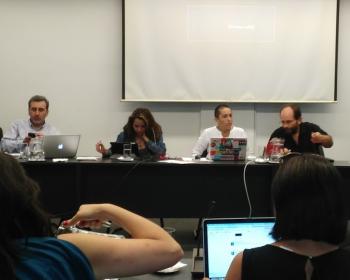Uruguay
Thirty civil society experts from eight Latin American countries are gathering in Montevideo, Uruguay, to discuss media concentration and identify the policy and regulatory strategies needed to strengthen media plurality in this new environment.
Ecuador has approved a communications law that recognises the right of universal access to information and communication technologies (ICT) and fairly apportions the frequency spectrum; on the other hand, it poses a threat to freedom of expression.
To celebrate LACNIC’s tenth anniversary, the region’s internet authority highlighted “internet leaders” that have contributed to the information society in Latin America. Among the awarded are APC’s Valeria Betancourt and Edmundo Vitale of EsLaRed, APC’s member in Venezuela.
New research in suggests that web 2.0 and online social networking were most used to connect research and policy in public awareness campaigns. Coordinated by Fundación Comunica, and supported by APC and IDRC, the book looks at twelve projects in Latin America.
After more than 30 years of working to promote information and communications technology in Africa, Nancy Hafkin was inducted into the Internet Wall of Fame. In an interview with APCNews, she shares the history of her work and that of communications technology in Africa, her interest in Africa, obstacles and achievements.
In an interview with APC, Maicu Alvarado and Gabriela Perona of CEPES share experiences of using the spectrum with a positive social impact and offer guidelines for thinking collectively about policies for managing the spectrum that aim for more than simply economic growth.
In Venezuela, community uses of the spectrum are privileged at the cost of generating uncertainty in the private sector. This discourages major investments in telecommunications and a wider discussion of the subject, according to Sandra Benítez and Ermanno Pietrosemoli of EsLaRed in this interview with APC.
Although in Argentina a debate does exist on the spectrum, it prioritises aspects related to broadcasting and obscures those related to telecommunications. Florencia Roveri and Flavia Fascendini of Nodo Tau clarify this issue in this interview conducted as part of the “Open spectrum for development” project.
Lack of knowledge about the ways that policies relating to the spectrum affect people’s lives is one of the primary obstacles for the participation of civil society in the regulatory debate. Marco Navas Alvear promotes solutions for this problem in this interview by APC as part of the “Open spectrum for development” project.
Management of the spectrum in Colombia is migrating towards a more flexible and participatory model. Nevertheless there is still a need for greater involvement of community media and social organisations as a counterweight to the voice of the commercial operators in discussions on the management of the spectrum, according to Lilian Chamorro of Colnodo, in this interview with APC.

Association for Progressive Communications (APC) 2022
Unless otherwise stated, content on the APC website is licensed under Creative Commons Attribution 4.0 International (CC BY 4.0)




